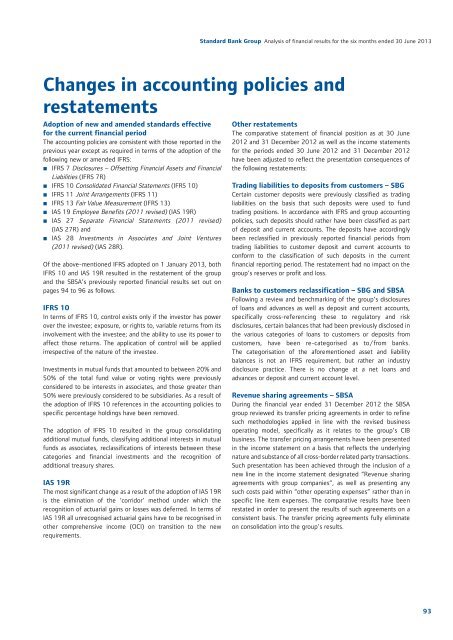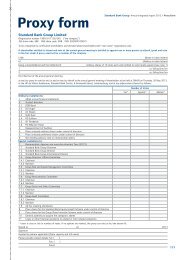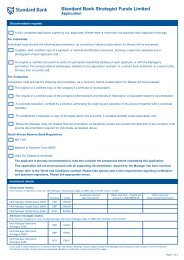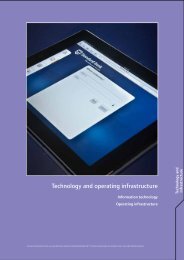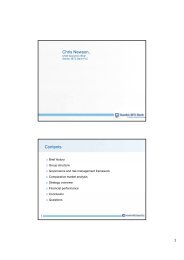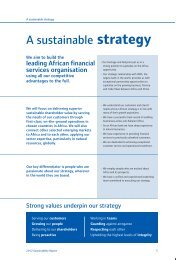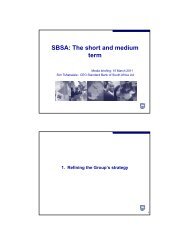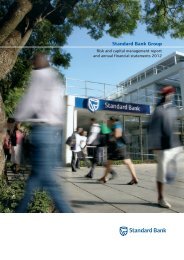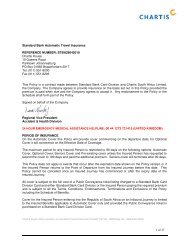Overview of financial results - Standard Bank - Investor Relations
Overview of financial results - Standard Bank - Investor Relations
Overview of financial results - Standard Bank - Investor Relations
You also want an ePaper? Increase the reach of your titles
YUMPU automatically turns print PDFs into web optimized ePapers that Google loves.
<strong>Standard</strong> <strong>Bank</strong> Group Analysis <strong>of</strong> <strong>financial</strong> <strong>results</strong> for the six months ended 30 June 2013<br />
Changes in accounting policies and<br />
restatements<br />
Adoption <strong>of</strong> new and amended standards effective<br />
for the current <strong>financial</strong> period<br />
The accounting policies are consistent with those reported in the<br />
previous year except as required in terms <strong>of</strong> the adoption <strong>of</strong> the<br />
following new or amended IFRS:<br />
• IFRS 7 Disclosures – Offsetting Financial Assets and Financial<br />
Liabilities (IFRS 7R)<br />
• IFRS 10 Consolidated Financial Statements (IFRS 10)<br />
• IFRS 11 Joint Arrangements (IFRS 11)<br />
• IFRS 13 Fair Value Measurement (IFRS 13)<br />
• IAS 19 Employee Benefits (2011 revised) (IAS 19R)<br />
• IAS 27 Separate Financial Statements (2011 revised)<br />
(IAS 27R) and<br />
• IAS 28 Investments in Associates and Joint Ventures<br />
(2011 revised) (IAS 28R).<br />
Of the above-mentioned IFRS adopted on 1 January 2013, both<br />
IFRS 10 and IAS 19R resulted in the restatement <strong>of</strong> the group<br />
and the SBSA’s previously reported <strong>financial</strong> <strong>results</strong> set out on<br />
pages 94 to 96 as follows.<br />
IFRS 10<br />
In terms <strong>of</strong> IFRS 10, control exists only if the investor has power<br />
over the investee; exposure, or rights to, variable returns from its<br />
involvement with the investee; and the ability to use its power to<br />
affect those returns. The application <strong>of</strong> control will be applied<br />
irrespective <strong>of</strong> the nature <strong>of</strong> the investee.<br />
Investments in mutual funds that amounted to between 20% and<br />
50% <strong>of</strong> the total fund value or voting rights were previously<br />
considered to be interests in associates, and those greater than<br />
50% were previously considered to be subsidiaries. As a result <strong>of</strong><br />
the adoption <strong>of</strong> IFRS 10 references in the accounting policies to<br />
specific percentage holdings have been removed.<br />
The adoption <strong>of</strong> IFRS 10 resulted in the group consolidating<br />
additional mutual funds, classifying additional interests in mutual<br />
funds as associates, reclassifications <strong>of</strong> interests between these<br />
categories and <strong>financial</strong> investments and the recognition <strong>of</strong><br />
additional treasury shares.<br />
IAS 19R<br />
The most significant change as a result <strong>of</strong> the adoption <strong>of</strong> IAS 19R<br />
is the elimination <strong>of</strong> the ‘corridor’ method under which the<br />
recognition <strong>of</strong> actuarial gains or losses was deferred. In terms <strong>of</strong><br />
IAS 19R all unrecognised actuarial gains have to be recognised in<br />
other comprehensive income (OCI) on transition to the new<br />
requirements.<br />
Other restatements<br />
The comparative statement <strong>of</strong> <strong>financial</strong> position as at 30 June<br />
2012 and 31 December 2012 as well as the income statements<br />
for the periods ended 30 June 2012 and 31 December 2012<br />
have been adjusted to reflect the presentation consequences <strong>of</strong><br />
the following restatements:<br />
Trading liabilities to deposits from customers – SBG<br />
Certain customer deposits were previously classified as trading<br />
liabilities on the basis that such deposits were used to fund<br />
trading positions. In accordance with IFRS and group accounting<br />
policies, such deposits should rather have been classified as part<br />
<strong>of</strong> deposit and current accounts. The deposits have accordingly<br />
been reclassified in previously reported <strong>financial</strong> periods from<br />
trading liabilities to customer deposit and current accounts to<br />
conform to the classification <strong>of</strong> such deposits in the current<br />
<strong>financial</strong> reporting period. The restatement had no impact on the<br />
group’s reserves or pr<strong>of</strong>it and loss.<br />
<strong>Bank</strong>s to customers reclassification – SBG and SBSA<br />
Following a review and benchmarking <strong>of</strong> the group’s disclosures<br />
<strong>of</strong> loans and advances as well as deposit and current accounts,<br />
specifically cross-referencing these to regulatory and risk<br />
disclosures, certain balances that had been previously disclosed in<br />
the various categories <strong>of</strong> loans to customers or deposits from<br />
customers, have been re-categorised as to/from banks.<br />
The categorisation <strong>of</strong> the aforementioned asset and liability<br />
balances is not an IFRS requirement, but rather an industry<br />
disclosure practice. There is no change at a net loans and<br />
advances or deposit and current account level.<br />
Revenue sharing agreements – SBSA<br />
During the <strong>financial</strong> year ended 31 December 2012 the SBSA<br />
group reviewed its transfer pricing agreements in order to refine<br />
such methodologies applied in line with the revised business<br />
operating model, specifically as it relates to the group’s CIB<br />
business. The transfer pricing arrangements have been presented<br />
in the income statement on a basis that reflects the underlying<br />
nature and substance <strong>of</strong> all cross-border related party transactions.<br />
Such presentation has been achieved through the inclusion <strong>of</strong> a<br />
new line in the income statement designated “Revenue sharing<br />
agreements with group companies”, as well as presenting any<br />
such costs paid within “other operating expenses” rather than in<br />
specific line item expenses. The comparative <strong>results</strong> have been<br />
restated in order to present the <strong>results</strong> <strong>of</strong> such agreements on a<br />
consistent basis. The transfer pricing agreements fully eliminate<br />
on consolidation into the group’s <strong>results</strong>.<br />
93


